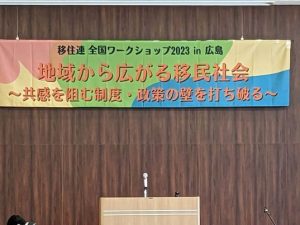ニュース詳細
![]() 2023.06.12
2023.06.12
移住者と連帯するネットワーク主催の広島で開催されたワークショップに出席してきました♪
6月10日と11日、移住者と連帯するネットワーク主催の広島で開催されたワークショップに出席してきました。移住者と連帯するネットワークワークショップは毎年1回、全国からさまざまな人が集まって開催されます。ワークショップの参加者は、移民の問題に取り組む団体や個人をつなぎ、情報共有と議論を深めるために開催しています。
10日(土)午前中の基調講演はクムスタカの中島眞一郎さんがベトナム人元技能実習生リンさんの最高裁判所無罪判決実現への取り組みについてでした。2つ目の基調講演は弁護士の端野真先生から「江田島事件から10年―技能実習制度廃止へ」についてでした。
分科会は6つにわかれました。1つめは労働・技能実習・特定技能、2つ目は難民・収容と非正規滞在者の生存権、3つ目は自治体施策、4つ目は女性、5つ目は子ども・若者、6つ目は相談・伴走支援、でした。会場に集まっての対面での開催は3年ぶりでしたが、150名くらいの参加があったそうです。
私は4の移住女性の分科会に参加しました。テーマは3つありました。
1つ目は、広島大学でNPO法人全国シェルターネット共同代表の北仲千里さんからの報告でした。2024年4月に施行予定の新しい法律、「移民女性が抱える困難と新しい支援制度」、つまり「困難女性支援法」の基本方針には「年齢、障害の有無、国籍を問わない」と明記しています。移民女性当事者やその支援者がこの新法をどう活用できるか、また施行までに制定されることになっている基本計画に移民女性の実情をどう反映させるかについて、報告者からの発題を受け、参加者で討論しました。
2つ目は、NPO法人移住者と連帯するネットワーク事務局長の山岸素子さんから改訂DV防止法についての報告でした。2021年3月、名古屋入管で凄惨な死を遂げたスリランカ女性ウィシュマさんはDV被害を受けて警察で助けを求めたにもかかわらず、非正規滞在で収容されDV被害からの救済を受けることもできませんでした。DV防止法が制定されてすでに20年余り。今、国会での「DV防止法」改正で移民女性への支援拡充ができるのか、残された課題は何か、を討論しました。
3つ目は弁護士の吉田容子先生から「離婚後の共同親権導入」について報告がありました。法制審議会の家族法制度の見直しの中で審議されている「離婚後の共同親権」導入問題について、移民女性の立場に立った報告と討論がされました。
親権を共同で行使するのはどういうことなのか、についての説明を受け、信頼関係が失われた離婚した父母間で子どもに関するさまざまな事項について共同で決定していくのは非現実的ではないかと感じました。
JFCネットワークのケースの関連でいえば、これまでは婚外子は父から認知されても親権者となれなかったが、共同親権が認められると、父が親権者となることを要求することが可能となるそうです。例えば、フィリピンに子どもを連れて帰り養育するなという父親がこれまでもいたが、単独親権であれば、親権者の母親の都合で子どもをフィリピンに連れて帰り養育することはできました。しかし、父が親権者ともなれば、母が子どもとどこに暮らし養育するのかという居所の指定にも権利を持つとなると、面倒なことになりそうなケースが出てくるような気がします。
JFCネットワークは会場で書籍と民芸品の販売をさせて頂きました♪ たくさんの方々に購入いただき、いろいろな会話ができてとてもよかったです💛
On June 10 and 11, I attended a workshop in Hiroshima organized by the Solidarity Network with Migrants in Japan. Workshops of the Solidarity Network with Migrants in Japan are held once a year, gathering a variety of people from all over the country. The workshop is held to connect organizations and individuals working on immigrant issues to share information and deepen discussion.
On Saturday, June 10, the morning session’s main speaker was Shinichiro Nakajima from Kumustaka, who spoke about his efforts to achieve the Supreme Court decision regarding the former Vietnamese technical intern Linh’s case of not guilty. The second main topic was “10 years after the Etajima case – the abolition of the technical internship system” by Atty.Makoto Hano.
There were six sub-sessions: the first on labor, technical internship, and specified technical skills; the second on refugees and detainees and the right to survival of undocumented people; the third on local government policies; the fourth on women; the fifth on children and youth; and the sixth on consultation and accompanying support. It was the first time in three years that we had gathered at the venue for a face-to-face meeting, and about 150 people attended.
I participated in the fourth session on migrant women. There were three topics.
The first was a reported by Ms. Chisato Kitanaka, co-chairperson of the NPO National Shelter Net at Hiroshima University, on a new law scheduled to take effect in April 2024, the “Difficulties Migrant Women Face and New Support Systems,” or the “Difficult Women Support Law,” which states in its basic policy that “regardless of age, disability, or nationality . The participants discussed how immigrant women themselves and their supporters can make use of this new law, and how to reflect the actual situation of immigrant women in the basic plan that is to be established before the law comes into effect, in response to a presentation by the reporter.
The second was a report on the revised DV Prevention Law by Ms. Motoko Yamagishi, Executive Director of NPO Network in Solidarity with Migrants, who reported that Ms. Wishma, a Sri Lankan woman who died horribly at the Nagoya Immigration Office in March 2021, was detained as an undocumented immigrant and was not given any relief from her DV, even though she sought help from the police after suffering from DV. It has been more than 20 years since the establishment of the Law for the Prevention of Domestic Violence. We discussed whether the revision of the Law for the Prevention of Domestic Violence in the Diet would provide more support for immigrant women and what issues remain to be solved.
Third, Atty. Yoko Yoshida reported on “Introduction of Joint Custody after Divorce. She reported and discussed from the perspective of immigrant women on the issue of the introduction of joint custody after divorce, which is being discussed by the Legislative Council in its review of the family law system.
After receiving an explanation on what it means to exercise joint custody, it seemed unrealistic to make joint decisions on various matters concerning children between divorced parents who have lost trust in each other.
In relation to the JFC Network’s case, previously, a child born out of wedlock could not be the custodian of a child even if recognized by the father, but if joint custody is granted, the father can request to become the custodian. For example, there have been fathers who have demanded that their children not be taken back to the Philippines to be raised, but if sole custody was exercised, the child could be taken back to the Philippines for the convenience of the custodial mother to raise the child. However, if the father has custody, he has the right to specify where the mother should live and raise the child, which may lead to some troublesome cases.
JFC Network had a booth at the event selling books and handicrafts 💛 Many people bought our products, and it was great to have conversations with them 💛












